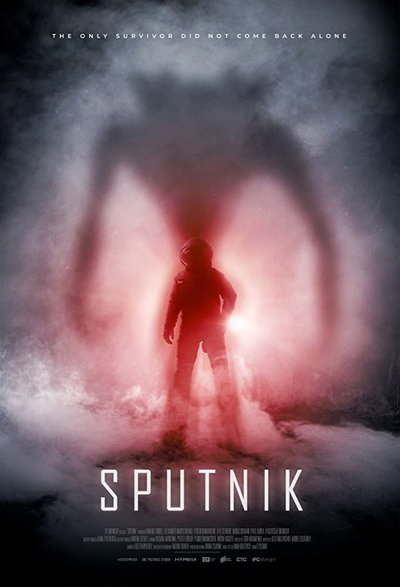Mladen and Del review ‘Sputnik’

Image courtesy of Sony Pictures.
“Sputnik” Starring Oksana Akinshina, Fyodor Bondarchuk, Pyotr Fyodorov, Anton Vasiliev and others. Directed by Egor Abramenko. Music by Oleg Karpachev. 113 minutes. Amazon Prime. Should be rated R for at least gore.
Mladen’s take
If the commie pinko fascist reds of the Putin regime savaging Russia today ever build an economy and arsenal like a few of that luckless nation’s citizens built the film “Sputnik,” the U.S. is in trouble. “Sputnik” is Grade A sci-fi horror nicely balanced with the correct doses of well acted storytelling, a world class score, and sophisticated, non-overbearing CGI. The movie is in Russian, so it’s captioned. Inevitably, something must’ve been lost in translation to English, but don’t let that discourage you from seeing the film. The captioning is good enough to convey its neat ideas and the character of the characters.
The Soviet Union is only seven years from disintegrating when this movie takes place. It’s 1983. It’s still the first Cold War. And, the Politburo needs a nationalistic win to boost the country’s sagging morale. The U.S.S.R. war in Afghanistan ain’t going well. Consumer goods are in short supply, unless you’re privileged. The Communist Party is going through leaders like Donald Moron Trump goes through unqualified cabinet secretaries. So, the addled Soviet Union turns to one of its few semi successes, space travel, for a taste of accomplishment. Two of its cosmonauts go into low-earth orbit, but three passengers return.
What unfolds next will have movie reviewers inevitably drawing comparisons between “Sputnik” and one of the two greatest sci-fi horror films ever, “Alien.” Labeling “Sputnik” an “Alien” derivative would be a false equivalency, however. It’d be like bashing “Alien” for mimicking “Invasion of the Body Snatchers.” There’s nothing new in moviedom about films creature featuring critters living inside us. “Invasion” with Donald Sutherland is a terrific movie, as is “Alien” with Sigourney Weaver. In “Sputnik,” Oksana Akinshina is top notch as her character, neuropsychiatrist Tatyana Klimova. Amiably menacing Fyodor Bondarchuk as Colonel Semiradov, charming survivor cosmonaut Konstantin Veshnyakov played by Pyotr Fyodorov, and Anton Vasiliev donning the role of ambitious but riven Dr. Yan Rigel are excellent, too. Even the movie’s title is well executed. “Sputnik” means “fellow traveler” or “companion,” but, generally, in a friendly way. That’s not what we get here.
“Sputnik” is one of the finest sci-fi movies I’ve seen in years. It’s better than “Life,” “Annihilation,” “High Life” or “Ad Astra.” It approaches “Europa Report” and “Arrival” in quality in terms of applying science to decipher what’s occurring, as well as acting and atmosphere. As with “Arrival,” for example, there’s a strong and intelligent female as the principal player in “Sputnik.” There’s tension and a twist or two as the characters develop. There’s realism. In “Arrival” the militaries of the world take the lead in trying to understand the aliens that have parked ships above certain spots on Earth. In “Sputnik,” the Soviet army’s Semiradov is trying to weaponize the trilling, cute-ish, slimy symbiont emerging nightly from the esophagus of Veshnyakov to feed. Pay attention to that part, the feeding. The food the alien needs is produced by a human’s endocrine subsystem. The way the creature ensures that happens is one of the movie’s provocative and original ideas. Loved it.
Come to think of it, there’s one other parallel between “Arrival” and “Sputnik.” This one falls into the category of irritating with a caveat. Both films have annoying time spanning flashes that involve children. Where that was needed to tell the story in “Arrival,” it was not needed to tell the story in “Sputnik.” But, that’s a minor quibble.
Disregard Del’s take, if he even suggests in his introduction that the film stinks. To dislike “Sputnik” is to demonstrate short-circuited sensory response, poor reasoning, a flawed recollection of movie history, moral turpitude and full-on soullessness. Watch “Sputnik.” It’s so good that I’m hoping to buy the film on Blu-ray. This way, when some National Security Agency trained, white hat hacker blows up the internet in anger after losing his Luke Skywalker figurine still in the original package that he put up as collateral to speculate on cryptocurrency futures, I’ll be able to watch this film again and again without worrying about access to a streaming service.

Del’s take
Man, what a stinker!
(I am picturing Mladen frothing at the mouth, his eyes goggling out like one of those squishy rubber chickens.)
On second thought, mark your calendars, folks, because today is one of those rare occasions – snow falling on Labor Day, the Florida unemployment compensation site actually working – when Mladen and I agree on something. “Sputnik” is a splendid film, the kind once made in America before the MBAs took over Hollywood.
“Sputnik” is a period piece, set in that happy time frame – for the United States, anyway – of the 1980s when MTV played music videos, imported beer became all the rage and many of us had waistline measurements that did not begin with the number 4. Except in “Sputnik” we are mired in the drab, run-down Soviet Union where people seem drab and run-down themselves, perhaps wearied by the relentless and dispiriting reality of communism. Neuropsychiatrist Tatyana Klimova, who has lost her job because of her unorthodox methods, has been summoned to a remote military facility to examine one of two recently returned cosmonauts – the other is deceased – who is experiencing amnesia. Except there’s a complication and I like the way Mladen put it: “Two of its cosmonauts go into low-earth orbit, but three passengers return.”
That’s a creepy premise and the movie delivers on creep, offering start-to-finish tension that lets up only briefly to set the stage of an original and surprising finish, one I’m surprised Mladen didn’t crab about seeing as how it’s laden with sentimentality.
Mladen is right. “Sputnik” has drawn comparisons to “Alien,” but the world of fiction, be it print or moving picture, provides a surfeit of tales about small groups confined to small spaces facing a singular threat – the Agatha Christie novel “And Then There Were None,” the lighthouse couple in “Day of the Triffids,” and even the happy gang of “The Walking Dead” to name a few. “Sputnik” may tread familiar ground but it strikes its own path.
It is no coincidence a movie about a man afflicted with a destructive internal force and the woman determined to save him takes place in a creaky totalitarian regime that is rotting from the inside, and Americans should pay heed to the cautionary aspects of the movie, which equally reflect the intellectual and moral rot eating the heart out of this country. That comment may not sit well with the Sieg Heil crowd that seems to be running Washington these days, but you know what? They’ll get over it.
The Russians and Chinese are improving their movie-making skills – “Winter of the Dead” and “The Wandering Earth” are two examples – and “Sputnik” continues that trend. I don’t draw any political conclusions from this fact – I think the improvements have come in spite of their no-fun, no-inspiration political and economic systems. Like Klimova of “Sputnik,” some moviemakers in those repressed states have risen above their hopeless surroundings to find some measure of success. Let’s hope that trend is just the beginning.
I give “Sputnik” an A.
There, Comrade Mladen. Are you happy now?
Mladen Rudman is a former journalist and technical writer. Del Stone Jr. is a former journalist and author.
![]()
Leave a Reply